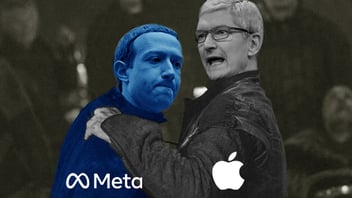WHAT COMES AFTER SURVEILLANCE CAPITALISM?
Bulletproof

Remember the early days of social media? All the talk of “democratization” of communication that would inevitably lead to a better, more tolerant and inclusive world for everyone?
Yeah, that didn’t happen.
Instead, we are in what Harvard’s Shoshana Zuboff calls a system of surveillance capitalism, where massive companies use our data to not only predict our behaviour but to directly influence it. She writes that this new world is “an expropriation of critical human rights that is best understood as a coup from above.” We have sacrificed our individual agency in return for the amusements of Instagram, TikTok and the rest.
“If you’re not paying for it then you are the product” – that is a golden rule of online services that depend on audience creation and aggregation for revenue. Those cookies that track your movement across the Internet, correlated with things like email addresses and affinity cards, create a web of data about you as a consumer that is exploited, at scale, by advertising networks. That’s one reason that only two companies (guess who?) take in more than 50 percent of digital ad spending in the U.S. So, half goes to those two companies (Facebook and Google, obviously) and the rest is split among every other publisher and service.
So much for democratization.
Most digital ads on websites are programmatic – that is, they are targeted algorithmically through a series of digital platforms and exchanges to reach the right person. The targeting may go something like, “women, aged 30-35 with two children, living in New Brunswick and considering buying a minivan.”
From a marketing perspective, this is gold. Why waste dollars on a print newspaper ad or on a TV spot reaching all those people who are not your audience when you can show your ad only to your specific target, for less. What’s not to love about this kind of advertising?
Tech companies talk a good game about the precision of their platforms, but the reality is not quite so rosy. Scott Galloway has a good post about how many programmatic networks are rife with fraud, with bots and fake sites consuming huge chunks of ad spending with no return. He’s predicting that the whole digital advertising ecosystem could collapse. Not sure that’s entirely likely but it underscores the need for businesses and organizations to work with trusted media buyers so you don’t end up getting scammed.
Perhaps the bigger threat to the survival of the surveillance capitalism model is regulation. Facebook, in particular, is facing increasing scrutiny for the impact of its services on democracy and human happiness. Disinformation from state and non-state actors is riling people up about the COVID-19 pandemic and the 2020 U.S. presidential election results, among countless other issues. Recent revelations by Facebook whistleblower Frances Haugen, who told American lawmakers that Facebook and its related products “harm children, stoke division and weaken our society,” have added more fuel to the fire, aided by Facebook’s clumsy and counterproductive defence of its services.
Apple has seen the writing on the wall and gotten on the side of increased consumer privacy. Its operating system (iOS) now gives iPhone and iPad users the ability to block apps from tracking your behaviour outside their own application. The Tim Hortons app, for example, does more than allow you to buy bad coffee through your phone – it tracks your location and predicts if you went to a Starbucks instead. Creepy, right?
So, with the likelihood of significant changes looming for the current surveillance-based ad model, what’s next for marketing?
Well, good advertising will always have a role in any marketing campaign, but more and more brands will rely on building a “Community of Interest” around their products. Creating something that people care about builds an emotional connection that is essential to a strong brand. It starts first with the product or service – it needs to be good and deliver on its promise in a way that differentiates it from its competitors. There won’t be much room for copycat products unless they compete solely on price, and we know how that usually ends.
With a quality product or service in hand, that Community of Interest will require two things:
- Strong social media presence on the right channels
- Good content that speaks to the community
Facebook isn’t going away, even if it changes. Nearly 3 billion people (!) use the site at least once per month, with many visiting it multiple times per day (yep, looking at you). But beyond Facebook and Instagram, there is the fast-growing TikTok (now with a billion users), our old friends Twitter, Pinterest, LinkedIn and other services that count hundreds of millions of users around the world.
These are tremendously powerful ways to build a community and shape a brand – if you have something to say and you say it in an engaging way.
That’s where the magic happens. Anyone can set up a TikTok account – knowing how to use it in a way that attracts and retains an audience is much, much harder. Brands need to understand the channels and platforms they are using, where the audience is and focus their efforts on those channels in a sincere and authentic way.
That means having a Point of View (POV), something that can be difficult and uncomfortable for many brands in this hypercritical age. Too many would prefer to say nothing rather than face the inevitable criticism that comes with having an opinion. But that is almost always a recipe for a long, slow decline. Better to take a stand on the things that matter to you, guided by the organization’s values.
Brands need to work hard to nurture that Community of Interest and POV by creating and sharing content that resonates. This is a question of quality over quantity, so don’t bother with those “Happy Monday!!!” posts that litter social networks. Remember, every post should add value and have meaning.
The “Mad Men” era of marketing ran from after World War II to the dawn of “Web 2.0” at the turn of the millennium. Surveillance capitalism will likely have a shorter lifespan, but the future is not yet known. A combination of regulatory intervention and advertiser pushback on weak results will drive change.
It will be interesting to watch how this unfolds.
Allan Gates
Allan Gates is the president of Bonfire.
Read the original article here
Check out their profile on CollabHub here
.png?width=600&height=187&name=Untitled%20design%20(2).png)


